ROP201 Restaurant Operations: Self-Evaluation in Hospitality
VerifiedAdded on 2023/05/28
|8
|2258
|467
Report
AI Summary
This document presents a self-evaluation review based on an 11-week experience at William Blue Dining, focusing on leadership challenges, service experiences, and professional practice as a restaurant supervisor. The leadership challenges identified include developing employees, inspiring others, and developing managerial effectiveness. The service experiences cover anticipating customer requests, reservation problems, and disapproval between departments. Professional practice insights discuss overcoming introversion and improving spoken English skills. The review reflects on personal strengths and weaknesses, highlighting the importance of communication and continuous improvement in the hospitality industry. This assignment is available on Desklib, a platform offering AI-based study tools and a vast library of solved assignments for students.
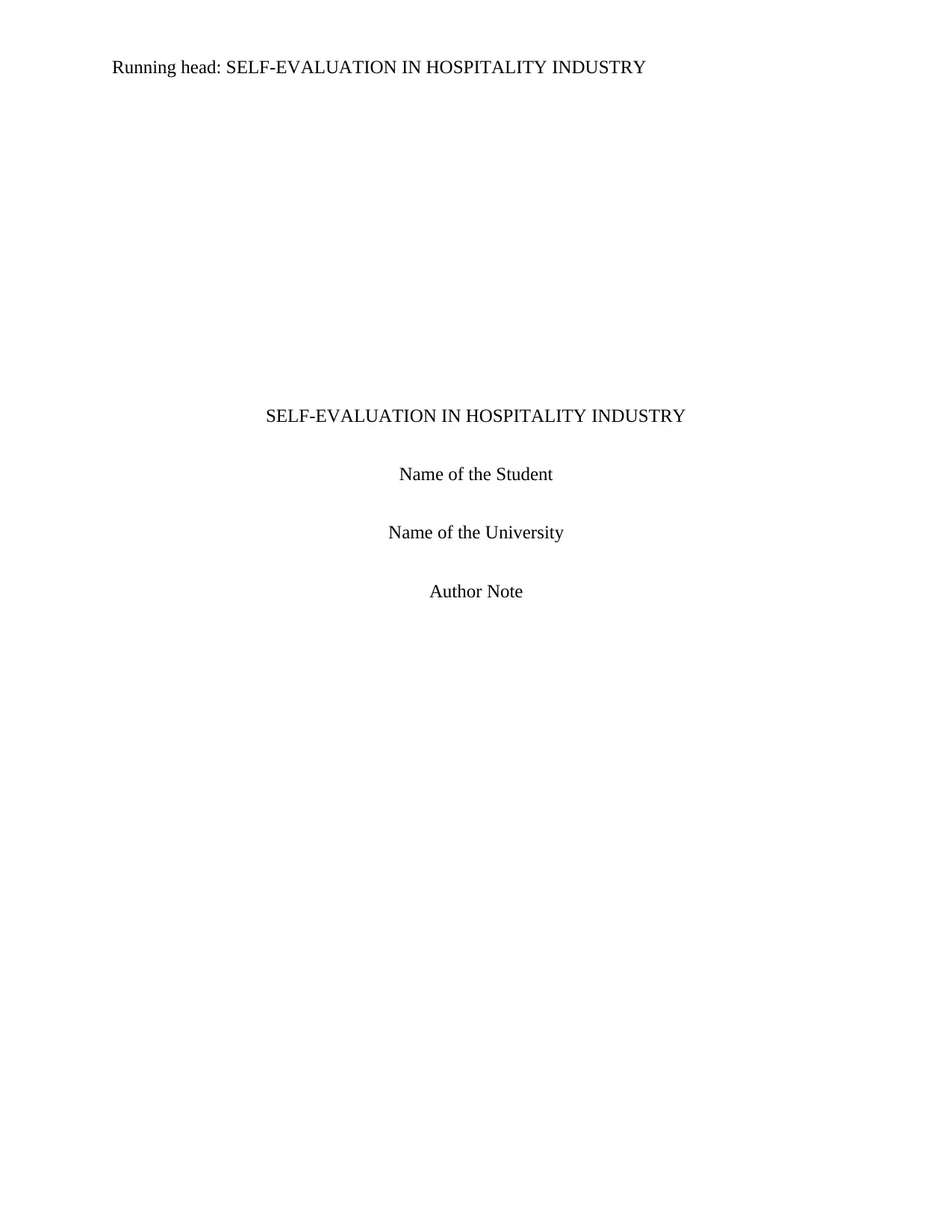
Running head: SELF-EVALUATION IN HOSPITALITY INDUSTRY
SELF-EVALUATION IN HOSPITALITY INDUSTRY
Name of the Student
Name of the University
Author Note
SELF-EVALUATION IN HOSPITALITY INDUSTRY
Name of the Student
Name of the University
Author Note
Paraphrase This Document
Need a fresh take? Get an instant paraphrase of this document with our AI Paraphraser
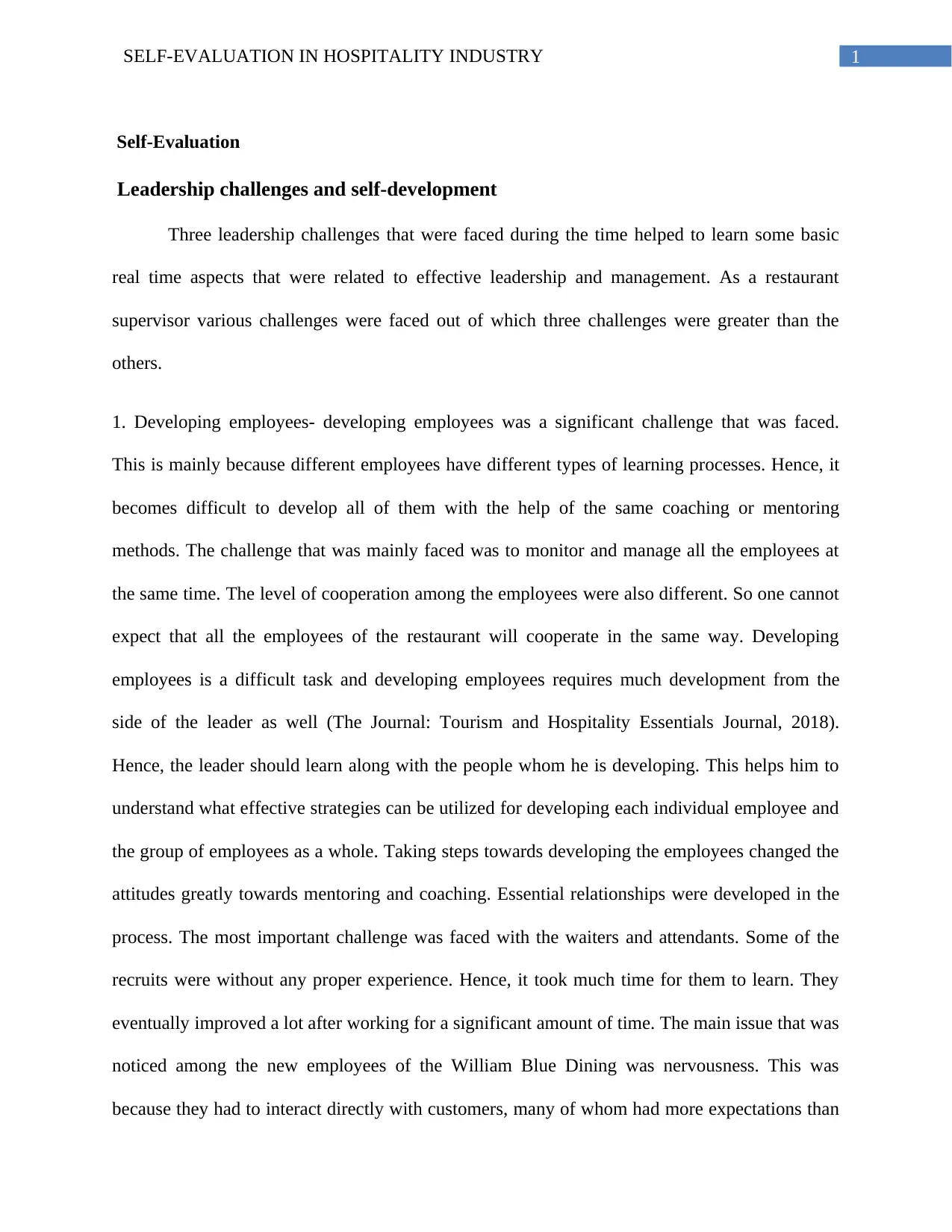
1SELF-EVALUATION IN HOSPITALITY INDUSTRY
Self-Evaluation
Leadership challenges and self-development
Three leadership challenges that were faced during the time helped to learn some basic
real time aspects that were related to effective leadership and management. As a restaurant
supervisor various challenges were faced out of which three challenges were greater than the
others.
1. Developing employees- developing employees was a significant challenge that was faced.
This is mainly because different employees have different types of learning processes. Hence, it
becomes difficult to develop all of them with the help of the same coaching or mentoring
methods. The challenge that was mainly faced was to monitor and manage all the employees at
the same time. The level of cooperation among the employees were also different. So one cannot
expect that all the employees of the restaurant will cooperate in the same way. Developing
employees is a difficult task and developing employees requires much development from the
side of the leader as well (The Journal: Tourism and Hospitality Essentials Journal, 2018).
Hence, the leader should learn along with the people whom he is developing. This helps him to
understand what effective strategies can be utilized for developing each individual employee and
the group of employees as a whole. Taking steps towards developing the employees changed the
attitudes greatly towards mentoring and coaching. Essential relationships were developed in the
process. The most important challenge was faced with the waiters and attendants. Some of the
recruits were without any proper experience. Hence, it took much time for them to learn. They
eventually improved a lot after working for a significant amount of time. The main issue that was
noticed among the new employees of the William Blue Dining was nervousness. This was
because they had to interact directly with customers, many of whom had more expectations than
Self-Evaluation
Leadership challenges and self-development
Three leadership challenges that were faced during the time helped to learn some basic
real time aspects that were related to effective leadership and management. As a restaurant
supervisor various challenges were faced out of which three challenges were greater than the
others.
1. Developing employees- developing employees was a significant challenge that was faced.
This is mainly because different employees have different types of learning processes. Hence, it
becomes difficult to develop all of them with the help of the same coaching or mentoring
methods. The challenge that was mainly faced was to monitor and manage all the employees at
the same time. The level of cooperation among the employees were also different. So one cannot
expect that all the employees of the restaurant will cooperate in the same way. Developing
employees is a difficult task and developing employees requires much development from the
side of the leader as well (The Journal: Tourism and Hospitality Essentials Journal, 2018).
Hence, the leader should learn along with the people whom he is developing. This helps him to
understand what effective strategies can be utilized for developing each individual employee and
the group of employees as a whole. Taking steps towards developing the employees changed the
attitudes greatly towards mentoring and coaching. Essential relationships were developed in the
process. The most important challenge was faced with the waiters and attendants. Some of the
recruits were without any proper experience. Hence, it took much time for them to learn. They
eventually improved a lot after working for a significant amount of time. The main issue that was
noticed among the new employees of the William Blue Dining was nervousness. This was
because they had to interact directly with customers, many of whom had more expectations than
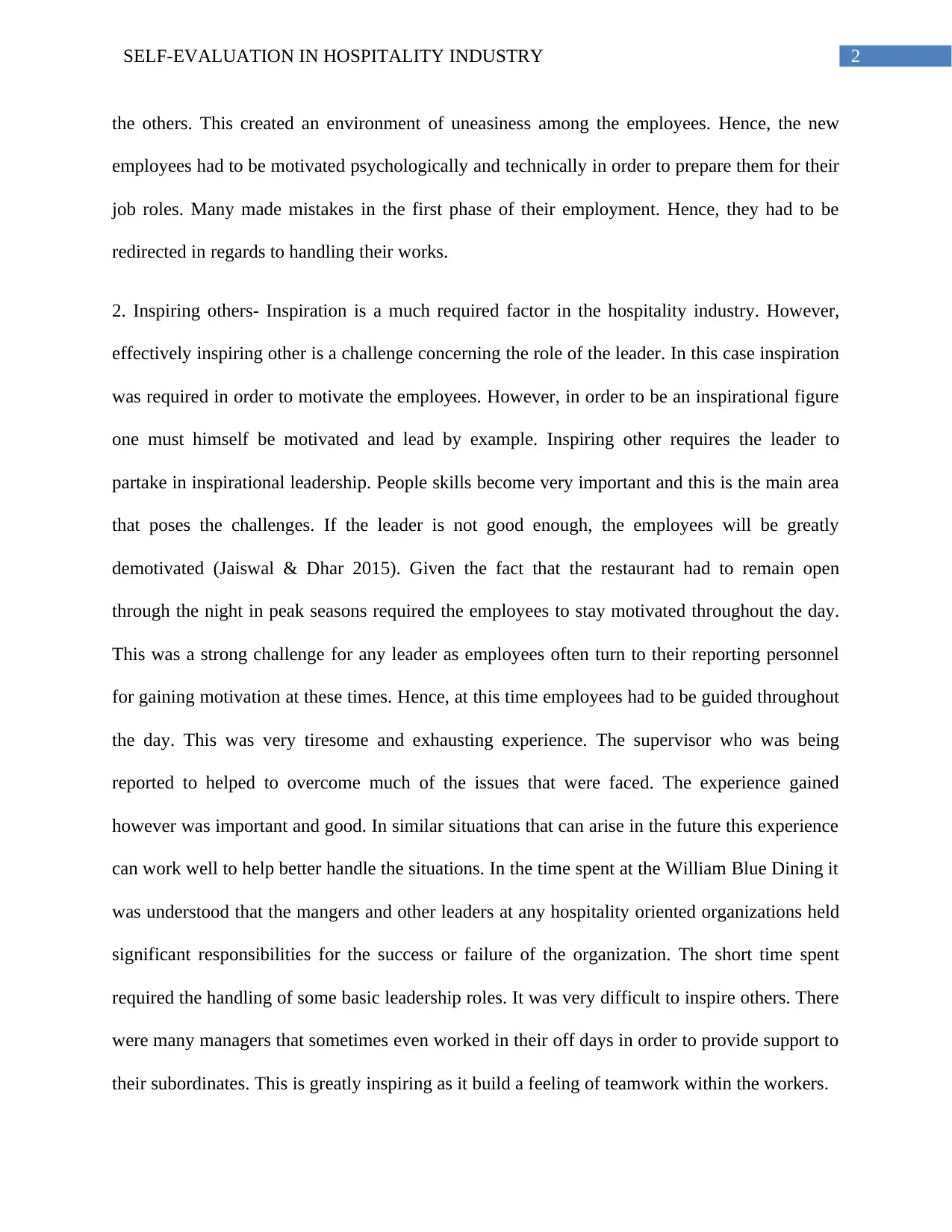
2SELF-EVALUATION IN HOSPITALITY INDUSTRY
the others. This created an environment of uneasiness among the employees. Hence, the new
employees had to be motivated psychologically and technically in order to prepare them for their
job roles. Many made mistakes in the first phase of their employment. Hence, they had to be
redirected in regards to handling their works.
2. Inspiring others- Inspiration is a much required factor in the hospitality industry. However,
effectively inspiring other is a challenge concerning the role of the leader. In this case inspiration
was required in order to motivate the employees. However, in order to be an inspirational figure
one must himself be motivated and lead by example. Inspiring other requires the leader to
partake in inspirational leadership. People skills become very important and this is the main area
that poses the challenges. If the leader is not good enough, the employees will be greatly
demotivated (Jaiswal & Dhar 2015). Given the fact that the restaurant had to remain open
through the night in peak seasons required the employees to stay motivated throughout the day.
This was a strong challenge for any leader as employees often turn to their reporting personnel
for gaining motivation at these times. Hence, at this time employees had to be guided throughout
the day. This was very tiresome and exhausting experience. The supervisor who was being
reported to helped to overcome much of the issues that were faced. The experience gained
however was important and good. In similar situations that can arise in the future this experience
can work well to help better handle the situations. In the time spent at the William Blue Dining it
was understood that the mangers and other leaders at any hospitality oriented organizations held
significant responsibilities for the success or failure of the organization. The short time spent
required the handling of some basic leadership roles. It was very difficult to inspire others. There
were many managers that sometimes even worked in their off days in order to provide support to
their subordinates. This is greatly inspiring as it build a feeling of teamwork within the workers.
the others. This created an environment of uneasiness among the employees. Hence, the new
employees had to be motivated psychologically and technically in order to prepare them for their
job roles. Many made mistakes in the first phase of their employment. Hence, they had to be
redirected in regards to handling their works.
2. Inspiring others- Inspiration is a much required factor in the hospitality industry. However,
effectively inspiring other is a challenge concerning the role of the leader. In this case inspiration
was required in order to motivate the employees. However, in order to be an inspirational figure
one must himself be motivated and lead by example. Inspiring other requires the leader to
partake in inspirational leadership. People skills become very important and this is the main area
that poses the challenges. If the leader is not good enough, the employees will be greatly
demotivated (Jaiswal & Dhar 2015). Given the fact that the restaurant had to remain open
through the night in peak seasons required the employees to stay motivated throughout the day.
This was a strong challenge for any leader as employees often turn to their reporting personnel
for gaining motivation at these times. Hence, at this time employees had to be guided throughout
the day. This was very tiresome and exhausting experience. The supervisor who was being
reported to helped to overcome much of the issues that were faced. The experience gained
however was important and good. In similar situations that can arise in the future this experience
can work well to help better handle the situations. In the time spent at the William Blue Dining it
was understood that the mangers and other leaders at any hospitality oriented organizations held
significant responsibilities for the success or failure of the organization. The short time spent
required the handling of some basic leadership roles. It was very difficult to inspire others. There
were many managers that sometimes even worked in their off days in order to provide support to
their subordinates. This is greatly inspiring as it build a feeling of teamwork within the workers.
⊘ This is a preview!⊘
Do you want full access?
Subscribe today to unlock all pages.

Trusted by 1+ million students worldwide
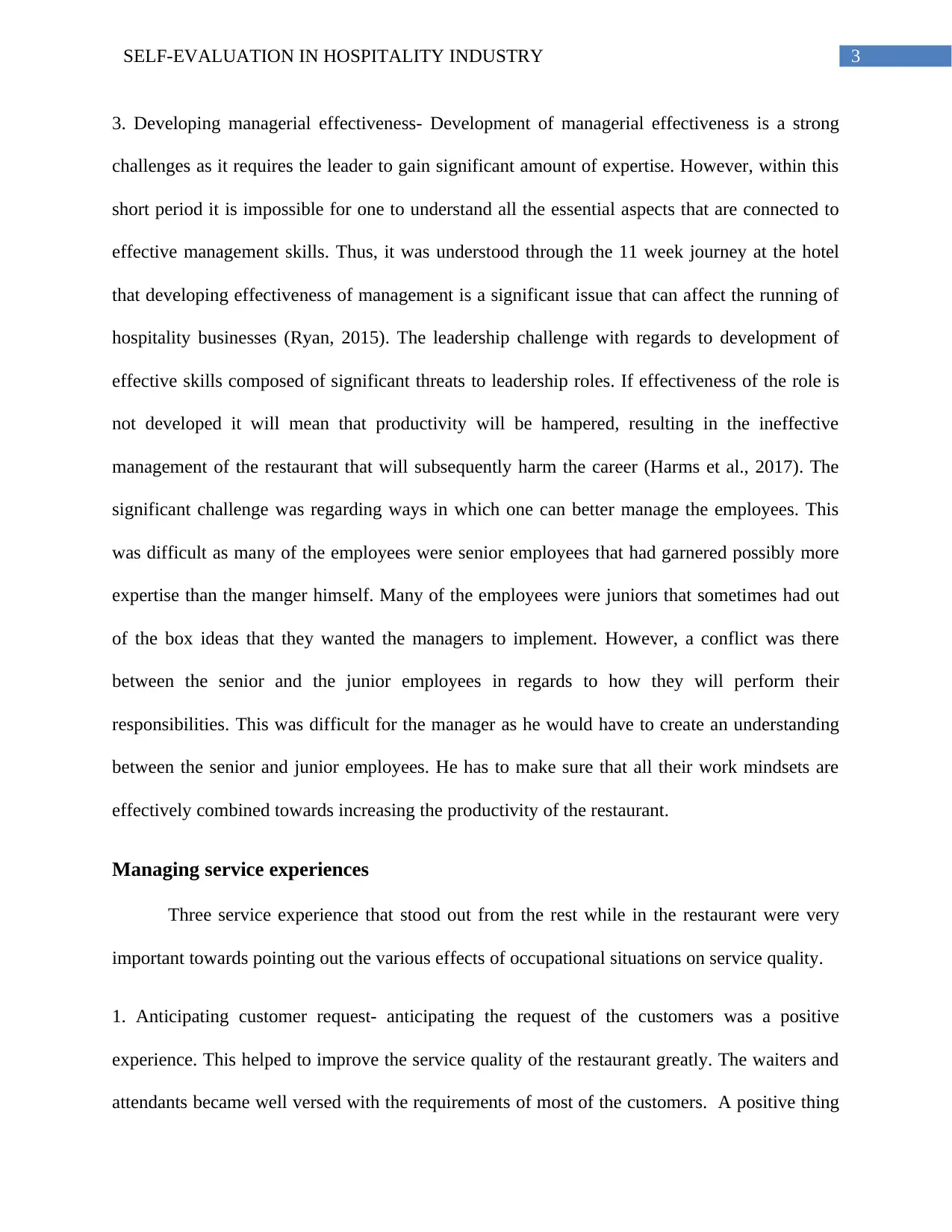
3SELF-EVALUATION IN HOSPITALITY INDUSTRY
3. Developing managerial effectiveness- Development of managerial effectiveness is a strong
challenges as it requires the leader to gain significant amount of expertise. However, within this
short period it is impossible for one to understand all the essential aspects that are connected to
effective management skills. Thus, it was understood through the 11 week journey at the hotel
that developing effectiveness of management is a significant issue that can affect the running of
hospitality businesses (Ryan, 2015). The leadership challenge with regards to development of
effective skills composed of significant threats to leadership roles. If effectiveness of the role is
not developed it will mean that productivity will be hampered, resulting in the ineffective
management of the restaurant that will subsequently harm the career (Harms et al., 2017). The
significant challenge was regarding ways in which one can better manage the employees. This
was difficult as many of the employees were senior employees that had garnered possibly more
expertise than the manger himself. Many of the employees were juniors that sometimes had out
of the box ideas that they wanted the managers to implement. However, a conflict was there
between the senior and the junior employees in regards to how they will perform their
responsibilities. This was difficult for the manager as he would have to create an understanding
between the senior and junior employees. He has to make sure that all their work mindsets are
effectively combined towards increasing the productivity of the restaurant.
Managing service experiences
Three service experience that stood out from the rest while in the restaurant were very
important towards pointing out the various effects of occupational situations on service quality.
1. Anticipating customer request- anticipating the request of the customers was a positive
experience. This helped to improve the service quality of the restaurant greatly. The waiters and
attendants became well versed with the requirements of most of the customers. A positive thing
3. Developing managerial effectiveness- Development of managerial effectiveness is a strong
challenges as it requires the leader to gain significant amount of expertise. However, within this
short period it is impossible for one to understand all the essential aspects that are connected to
effective management skills. Thus, it was understood through the 11 week journey at the hotel
that developing effectiveness of management is a significant issue that can affect the running of
hospitality businesses (Ryan, 2015). The leadership challenge with regards to development of
effective skills composed of significant threats to leadership roles. If effectiveness of the role is
not developed it will mean that productivity will be hampered, resulting in the ineffective
management of the restaurant that will subsequently harm the career (Harms et al., 2017). The
significant challenge was regarding ways in which one can better manage the employees. This
was difficult as many of the employees were senior employees that had garnered possibly more
expertise than the manger himself. Many of the employees were juniors that sometimes had out
of the box ideas that they wanted the managers to implement. However, a conflict was there
between the senior and the junior employees in regards to how they will perform their
responsibilities. This was difficult for the manager as he would have to create an understanding
between the senior and junior employees. He has to make sure that all their work mindsets are
effectively combined towards increasing the productivity of the restaurant.
Managing service experiences
Three service experience that stood out from the rest while in the restaurant were very
important towards pointing out the various effects of occupational situations on service quality.
1. Anticipating customer request- anticipating the request of the customers was a positive
experience. This helped to improve the service quality of the restaurant greatly. The waiters and
attendants became well versed with the requirements of most of the customers. A positive thing
Paraphrase This Document
Need a fresh take? Get an instant paraphrase of this document with our AI Paraphraser
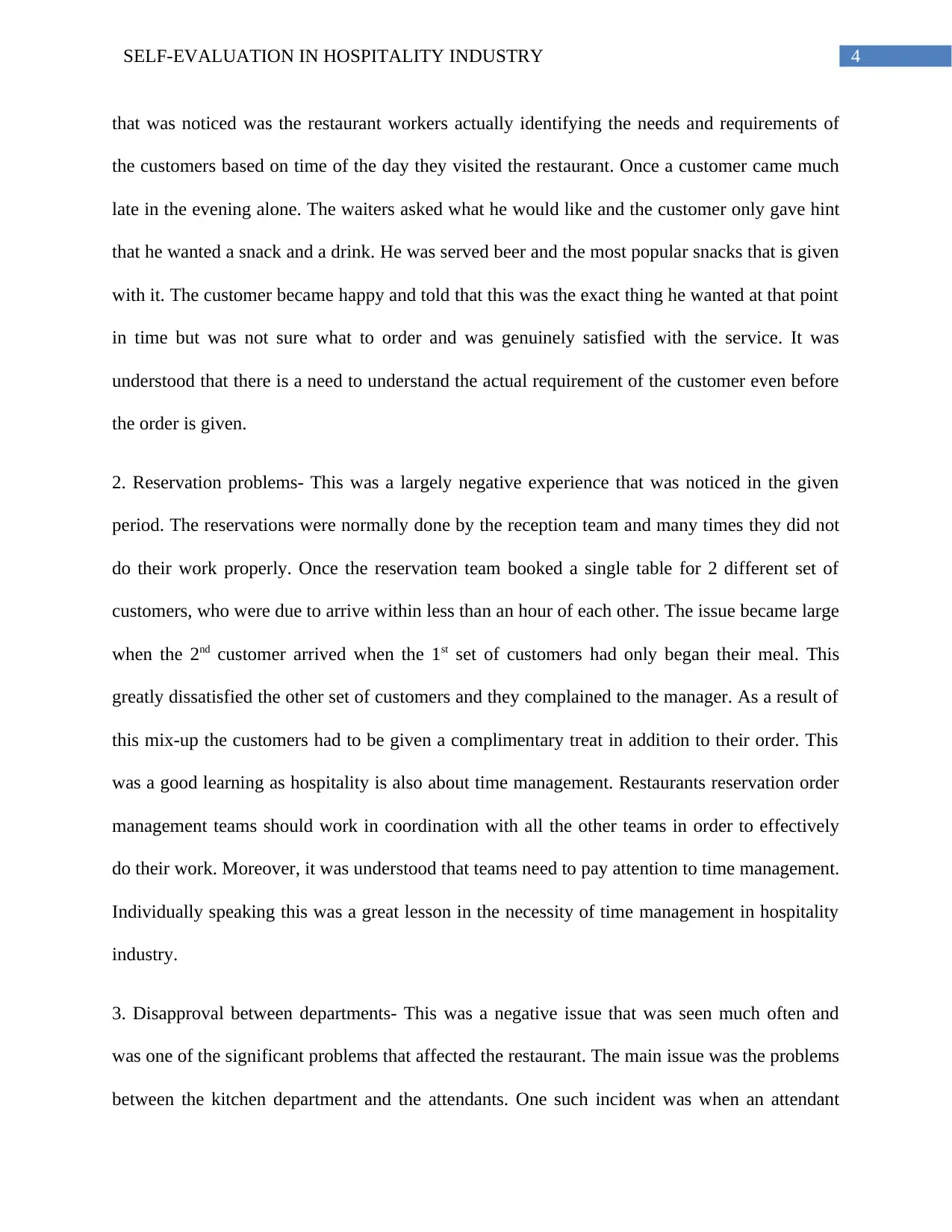
4SELF-EVALUATION IN HOSPITALITY INDUSTRY
that was noticed was the restaurant workers actually identifying the needs and requirements of
the customers based on time of the day they visited the restaurant. Once a customer came much
late in the evening alone. The waiters asked what he would like and the customer only gave hint
that he wanted a snack and a drink. He was served beer and the most popular snacks that is given
with it. The customer became happy and told that this was the exact thing he wanted at that point
in time but was not sure what to order and was genuinely satisfied with the service. It was
understood that there is a need to understand the actual requirement of the customer even before
the order is given.
2. Reservation problems- This was a largely negative experience that was noticed in the given
period. The reservations were normally done by the reception team and many times they did not
do their work properly. Once the reservation team booked a single table for 2 different set of
customers, who were due to arrive within less than an hour of each other. The issue became large
when the 2nd customer arrived when the 1st set of customers had only began their meal. This
greatly dissatisfied the other set of customers and they complained to the manager. As a result of
this mix-up the customers had to be given a complimentary treat in addition to their order. This
was a good learning as hospitality is also about time management. Restaurants reservation order
management teams should work in coordination with all the other teams in order to effectively
do their work. Moreover, it was understood that teams need to pay attention to time management.
Individually speaking this was a great lesson in the necessity of time management in hospitality
industry.
3. Disapproval between departments- This was a negative issue that was seen much often and
was one of the significant problems that affected the restaurant. The main issue was the problems
between the kitchen department and the attendants. One such incident was when an attendant
that was noticed was the restaurant workers actually identifying the needs and requirements of
the customers based on time of the day they visited the restaurant. Once a customer came much
late in the evening alone. The waiters asked what he would like and the customer only gave hint
that he wanted a snack and a drink. He was served beer and the most popular snacks that is given
with it. The customer became happy and told that this was the exact thing he wanted at that point
in time but was not sure what to order and was genuinely satisfied with the service. It was
understood that there is a need to understand the actual requirement of the customer even before
the order is given.
2. Reservation problems- This was a largely negative experience that was noticed in the given
period. The reservations were normally done by the reception team and many times they did not
do their work properly. Once the reservation team booked a single table for 2 different set of
customers, who were due to arrive within less than an hour of each other. The issue became large
when the 2nd customer arrived when the 1st set of customers had only began their meal. This
greatly dissatisfied the other set of customers and they complained to the manager. As a result of
this mix-up the customers had to be given a complimentary treat in addition to their order. This
was a good learning as hospitality is also about time management. Restaurants reservation order
management teams should work in coordination with all the other teams in order to effectively
do their work. Moreover, it was understood that teams need to pay attention to time management.
Individually speaking this was a great lesson in the necessity of time management in hospitality
industry.
3. Disapproval between departments- This was a negative issue that was seen much often and
was one of the significant problems that affected the restaurant. The main issue was the problems
between the kitchen department and the attendants. One such incident was when an attendant
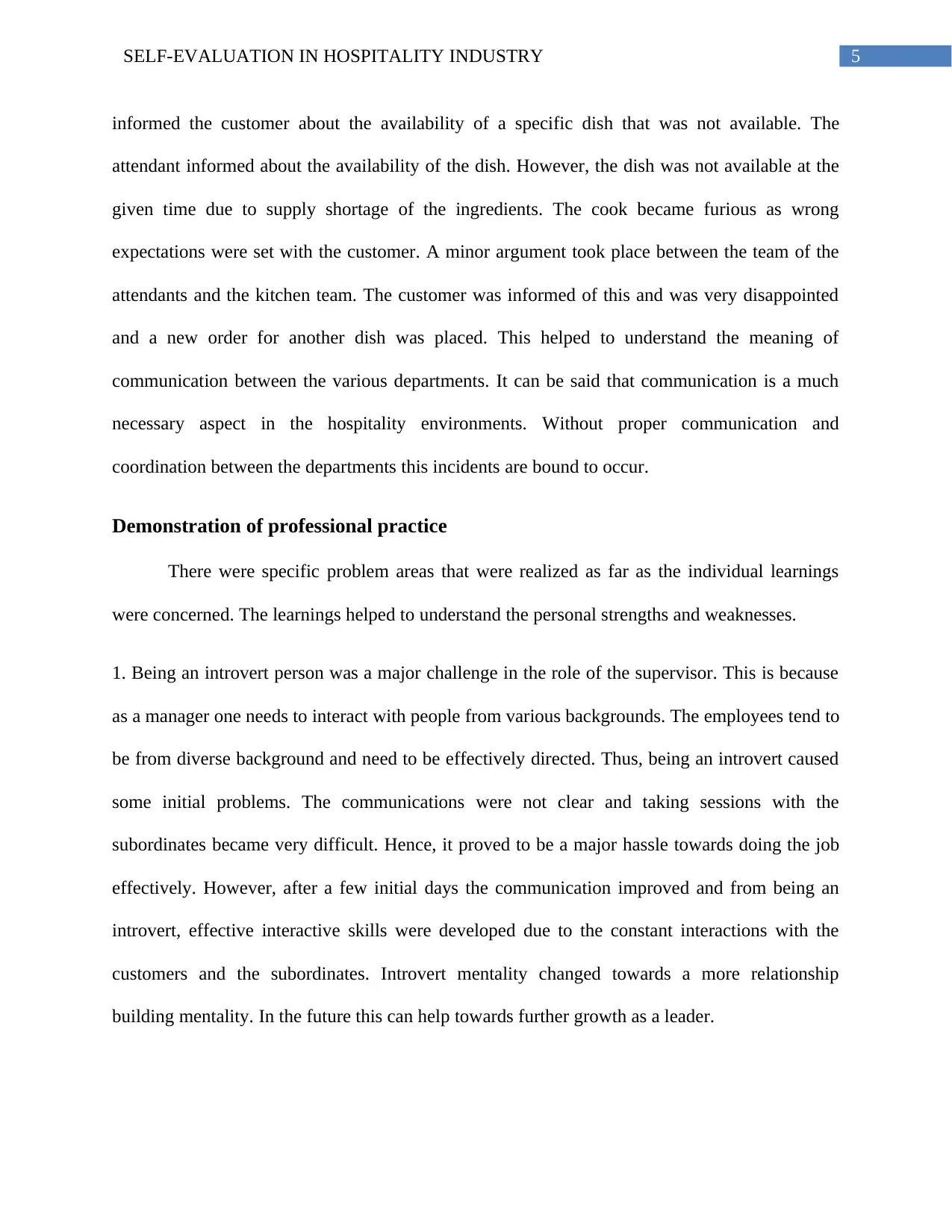
5SELF-EVALUATION IN HOSPITALITY INDUSTRY
informed the customer about the availability of a specific dish that was not available. The
attendant informed about the availability of the dish. However, the dish was not available at the
given time due to supply shortage of the ingredients. The cook became furious as wrong
expectations were set with the customer. A minor argument took place between the team of the
attendants and the kitchen team. The customer was informed of this and was very disappointed
and a new order for another dish was placed. This helped to understand the meaning of
communication between the various departments. It can be said that communication is a much
necessary aspect in the hospitality environments. Without proper communication and
coordination between the departments this incidents are bound to occur.
Demonstration of professional practice
There were specific problem areas that were realized as far as the individual learnings
were concerned. The learnings helped to understand the personal strengths and weaknesses.
1. Being an introvert person was a major challenge in the role of the supervisor. This is because
as a manager one needs to interact with people from various backgrounds. The employees tend to
be from diverse background and need to be effectively directed. Thus, being an introvert caused
some initial problems. The communications were not clear and taking sessions with the
subordinates became very difficult. Hence, it proved to be a major hassle towards doing the job
effectively. However, after a few initial days the communication improved and from being an
introvert, effective interactive skills were developed due to the constant interactions with the
customers and the subordinates. Introvert mentality changed towards a more relationship
building mentality. In the future this can help towards further growth as a leader.
informed the customer about the availability of a specific dish that was not available. The
attendant informed about the availability of the dish. However, the dish was not available at the
given time due to supply shortage of the ingredients. The cook became furious as wrong
expectations were set with the customer. A minor argument took place between the team of the
attendants and the kitchen team. The customer was informed of this and was very disappointed
and a new order for another dish was placed. This helped to understand the meaning of
communication between the various departments. It can be said that communication is a much
necessary aspect in the hospitality environments. Without proper communication and
coordination between the departments this incidents are bound to occur.
Demonstration of professional practice
There were specific problem areas that were realized as far as the individual learnings
were concerned. The learnings helped to understand the personal strengths and weaknesses.
1. Being an introvert person was a major challenge in the role of the supervisor. This is because
as a manager one needs to interact with people from various backgrounds. The employees tend to
be from diverse background and need to be effectively directed. Thus, being an introvert caused
some initial problems. The communications were not clear and taking sessions with the
subordinates became very difficult. Hence, it proved to be a major hassle towards doing the job
effectively. However, after a few initial days the communication improved and from being an
introvert, effective interactive skills were developed due to the constant interactions with the
customers and the subordinates. Introvert mentality changed towards a more relationship
building mentality. In the future this can help towards further growth as a leader.
⊘ This is a preview!⊘
Do you want full access?
Subscribe today to unlock all pages.

Trusted by 1+ million students worldwide
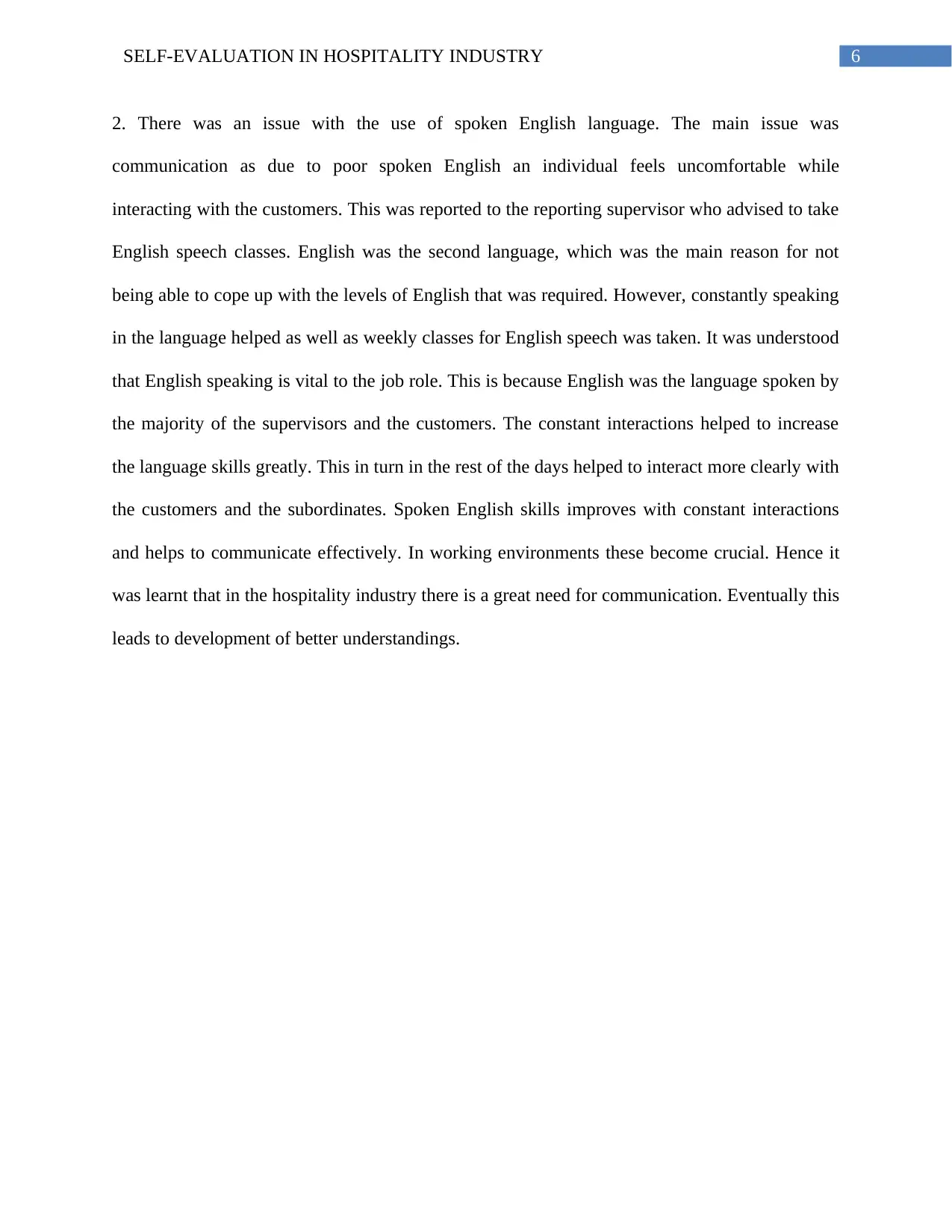
6SELF-EVALUATION IN HOSPITALITY INDUSTRY
2. There was an issue with the use of spoken English language. The main issue was
communication as due to poor spoken English an individual feels uncomfortable while
interacting with the customers. This was reported to the reporting supervisor who advised to take
English speech classes. English was the second language, which was the main reason for not
being able to cope up with the levels of English that was required. However, constantly speaking
in the language helped as well as weekly classes for English speech was taken. It was understood
that English speaking is vital to the job role. This is because English was the language spoken by
the majority of the supervisors and the customers. The constant interactions helped to increase
the language skills greatly. This in turn in the rest of the days helped to interact more clearly with
the customers and the subordinates. Spoken English skills improves with constant interactions
and helps to communicate effectively. In working environments these become crucial. Hence it
was learnt that in the hospitality industry there is a great need for communication. Eventually this
leads to development of better understandings.
2. There was an issue with the use of spoken English language. The main issue was
communication as due to poor spoken English an individual feels uncomfortable while
interacting with the customers. This was reported to the reporting supervisor who advised to take
English speech classes. English was the second language, which was the main reason for not
being able to cope up with the levels of English that was required. However, constantly speaking
in the language helped as well as weekly classes for English speech was taken. It was understood
that English speaking is vital to the job role. This is because English was the language spoken by
the majority of the supervisors and the customers. The constant interactions helped to increase
the language skills greatly. This in turn in the rest of the days helped to interact more clearly with
the customers and the subordinates. Spoken English skills improves with constant interactions
and helps to communicate effectively. In working environments these become crucial. Hence it
was learnt that in the hospitality industry there is a great need for communication. Eventually this
leads to development of better understandings.
Paraphrase This Document
Need a fresh take? Get an instant paraphrase of this document with our AI Paraphraser
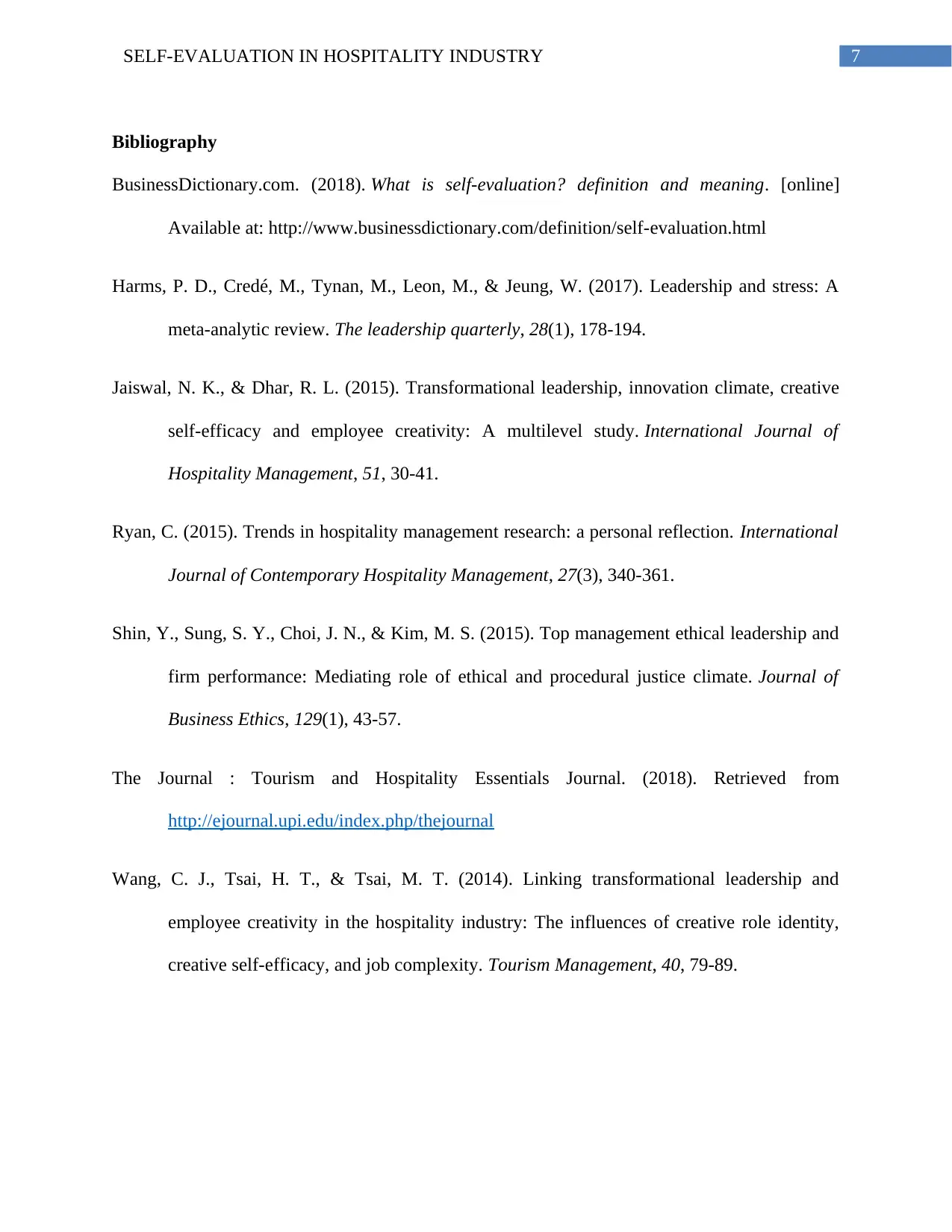
7SELF-EVALUATION IN HOSPITALITY INDUSTRY
Bibliography
BusinessDictionary.com. (2018). What is self-evaluation? definition and meaning. [online]
Available at: http://www.businessdictionary.com/definition/self-evaluation.html
Harms, P. D., Credé, M., Tynan, M., Leon, M., & Jeung, W. (2017). Leadership and stress: A
meta-analytic review. The leadership quarterly, 28(1), 178-194.
Jaiswal, N. K., & Dhar, R. L. (2015). Transformational leadership, innovation climate, creative
self-efficacy and employee creativity: A multilevel study. International Journal of
Hospitality Management, 51, 30-41.
Ryan, C. (2015). Trends in hospitality management research: a personal reflection. International
Journal of Contemporary Hospitality Management, 27(3), 340-361.
Shin, Y., Sung, S. Y., Choi, J. N., & Kim, M. S. (2015). Top management ethical leadership and
firm performance: Mediating role of ethical and procedural justice climate. Journal of
Business Ethics, 129(1), 43-57.
The Journal : Tourism and Hospitality Essentials Journal. (2018). Retrieved from
http://ejournal.upi.edu/index.php/thejournal
Wang, C. J., Tsai, H. T., & Tsai, M. T. (2014). Linking transformational leadership and
employee creativity in the hospitality industry: The influences of creative role identity,
creative self-efficacy, and job complexity. Tourism Management, 40, 79-89.
Bibliography
BusinessDictionary.com. (2018). What is self-evaluation? definition and meaning. [online]
Available at: http://www.businessdictionary.com/definition/self-evaluation.html
Harms, P. D., Credé, M., Tynan, M., Leon, M., & Jeung, W. (2017). Leadership and stress: A
meta-analytic review. The leadership quarterly, 28(1), 178-194.
Jaiswal, N. K., & Dhar, R. L. (2015). Transformational leadership, innovation climate, creative
self-efficacy and employee creativity: A multilevel study. International Journal of
Hospitality Management, 51, 30-41.
Ryan, C. (2015). Trends in hospitality management research: a personal reflection. International
Journal of Contemporary Hospitality Management, 27(3), 340-361.
Shin, Y., Sung, S. Y., Choi, J. N., & Kim, M. S. (2015). Top management ethical leadership and
firm performance: Mediating role of ethical and procedural justice climate. Journal of
Business Ethics, 129(1), 43-57.
The Journal : Tourism and Hospitality Essentials Journal. (2018). Retrieved from
http://ejournal.upi.edu/index.php/thejournal
Wang, C. J., Tsai, H. T., & Tsai, M. T. (2014). Linking transformational leadership and
employee creativity in the hospitality industry: The influences of creative role identity,
creative self-efficacy, and job complexity. Tourism Management, 40, 79-89.
1 out of 8
Related Documents
Your All-in-One AI-Powered Toolkit for Academic Success.
+13062052269
info@desklib.com
Available 24*7 on WhatsApp / Email
![[object Object]](/_next/static/media/star-bottom.7253800d.svg)
Unlock your academic potential
Copyright © 2020–2026 A2Z Services. All Rights Reserved. Developed and managed by ZUCOL.





